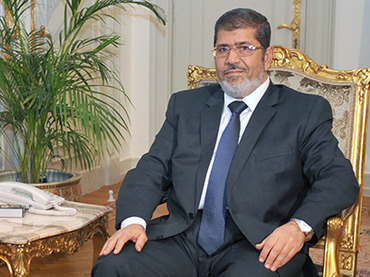
The two issues were at the heart of sometimes violent protests that have rocked Cairo and other parts of Egypt over the past two weeks.
On Wednesday, seven people died and hundreds were hurt in clashes between rival supporters in front of Morsi's presidential palace.
Qandil did not give details of how the decree would be amended, but told the private television network Al-Mihwar that Morsi had tasked six officials to draw up a changed decree that would be ready by early Sunday.
Morsi also said he wished to delay a December 15 referendum on the disputed constitution, but needed to find a way to avoid legal problems associated with changing the date, Qandil said.
The main opposition bloc, the National Salvation Front, has said it is ready for "serious and objective dialogue" as soon as Morsi meets their demands to scrap the decree and drop the referendum.
It rebuffed an earlier offer by Morsi on Thursday to open talks because the president did not give way on those two points.
But on Saturday, Egypt's powerful military put its foot down, telling both sides to start dialogue, which it said in a statement is the "only way to reach agreement and achieve the interests of the nation and its citizens."
The army warned: "The opposite of that will take us into a dark tunnel with disastrous results -- and that is something we will not allow."
Massive anti-Morsi protests that had taken place every previous night this week failed to materialise late on Saturday.
However, the presidential palace remained ringed by tanks and troops deployed on Thursday, the day after the deadly clashes.
The military on Saturday underlined that it "stands always with the great Egyptian people and insists on its unity," but also said it was its duty to protect state institutions.
It urged a solution based on "democratic rules."
The stark ultimatum by the army seemed to prompt the change of direction by Morsi, who up to now had been defiant.
Earlier on Saturday, 13 Islamist parties, including the political wing of the Muslim Brotherhood backing Morsi, issued a declaration that the referendum would go ahead as planned, "with no modification or delay."
Wayne White, a former senior US State Department intelligence official who is now a policy expert with Washington's Middle East Policy Council, told AFP that the military's involvement in the crisis was key.
If the army saw sufficient opposition to Morsi, "they could very well inform him that they cannot continue to keep the peace and that he should make serious concessions to the opposition," he said.
-------------------------------------------------------------------------------------------
On Wednesday, seven people died and hundreds were hurt in clashes between rival supporters in front of Morsi's presidential palace.
Qandil did not give details of how the decree would be amended, but told the private television network Al-Mihwar that Morsi had tasked six officials to draw up a changed decree that would be ready by early Sunday.
Morsi also said he wished to delay a December 15 referendum on the disputed constitution, but needed to find a way to avoid legal problems associated with changing the date, Qandil said.
The main opposition bloc, the National Salvation Front, has said it is ready for "serious and objective dialogue" as soon as Morsi meets their demands to scrap the decree and drop the referendum.
It rebuffed an earlier offer by Morsi on Thursday to open talks because the president did not give way on those two points.
But on Saturday, Egypt's powerful military put its foot down, telling both sides to start dialogue, which it said in a statement is the "only way to reach agreement and achieve the interests of the nation and its citizens."
The army warned: "The opposite of that will take us into a dark tunnel with disastrous results -- and that is something we will not allow."
Massive anti-Morsi protests that had taken place every previous night this week failed to materialise late on Saturday.
However, the presidential palace remained ringed by tanks and troops deployed on Thursday, the day after the deadly clashes.
The military on Saturday underlined that it "stands always with the great Egyptian people and insists on its unity," but also said it was its duty to protect state institutions.
It urged a solution based on "democratic rules."
The stark ultimatum by the army seemed to prompt the change of direction by Morsi, who up to now had been defiant.
Earlier on Saturday, 13 Islamist parties, including the political wing of the Muslim Brotherhood backing Morsi, issued a declaration that the referendum would go ahead as planned, "with no modification or delay."
Wayne White, a former senior US State Department intelligence official who is now a policy expert with Washington's Middle East Policy Council, told AFP that the military's involvement in the crisis was key.
If the army saw sufficient opposition to Morsi, "they could very well inform him that they cannot continue to keep the peace and that he should make serious concessions to the opposition," he said.
-------------------------------------------------------------------------------------------









 Home
Home Politics
Politics









